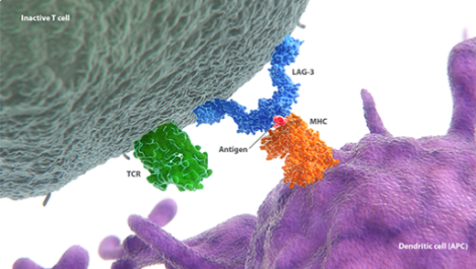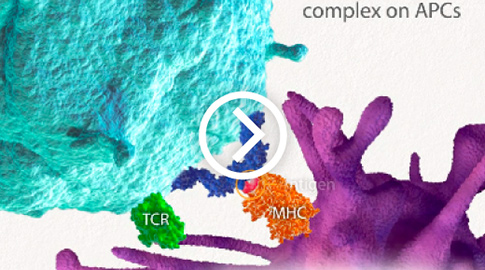LAG-3

LAG-3(Lymphocyte-activation gene 3)は、免疫チェックポイント受容体であり、T細胞による免疫応答を抑制することができます。他の免疫チェックポイント経路と組み合わせてLAG-3を阻害することで、抗腫瘍活性を高めることが期待されます。
がんでの役割
- がんではLAG-3の発現が上昇し、免疫細胞への負のシグナル伝達により、T細胞の疲弊を招いている可能性があります7,8。
- 疲弊したT細胞ではがん細胞に対する攻撃力が低下し、その結果、腫瘍が増大する可能性があります7。
LAG-3およびPD-1の両者を同時に発現するT細胞は、LAG-3を単独で発現するT細胞と比較して、疲弊の程度が大きいことが示されています9。 - LAG-3は、また、Tregの免疫抑制活性を惹起します1。
- がんでは、LAG-3を発現しているTregが腫瘍部位に集まり、細胞傷害性T細胞を強力に抑制します10。 - LAG-3の発現増加は、複数のがん腫において予後不良と関連付けられています3,11。
前臨床のエビデンス
- 前臨床試験では、PD-1経路単独の阻害によってLAG-3の発現が上昇することにより、腫瘍の増大を維持することが示されています12。
- 複数の前臨床試験で、LAG-3および他の免疫チェックポイント経路の阻害により、T細胞が活性化され、抗腫瘍活性が向上することで腫瘍が縮小することが示されています13-15。

LAG-3はどのようにしてT細胞の活性を抑制するのでしょうか?
LAG-3によるT細胞の活性化および増殖を負に制御するメカニズムを学ぶ
REFERENCES–LAG-3
- Huang CT, Workman CJ, Flies D, et al. Role of LAG-3 in regulatory T cells. Immunity. 2004;21(4):503-513.
- Baixeras E, Huard B, Miossec C, et al. Characterization of the lymphocyte activation gene 3–encoded protein: a new ligand for human leukocyte antigen class II antigens. J Exp Med. 1992;176(2):327-337.
- Deng W-W, Mao L, Yu G-T, et al. LAG-3 confers poor prognosis and its blockade reshapes antitumor response in head and neck squamous cell carcinoma. Oncoimmunology. 2016;5(11):e1239005. doi:10.1080/2162402X.2016.1239005.
- Huard B, Prigent P, Tournier M, Bruniquel D, Triebel F. CD4/major histocompatibility complex class II interaction analyzed with CD4- and lymphocyte activation gene-3 (LAG-3)-Ig fusion proteins. Eur J Immunol. 1995;25(9):2718-2721.
- Workman CJ, Cauley LS, Kim IJ, Blackman MA, Woodland DL, Vignali AA. Lymphocyte activation gene-3 (CD223) regulates the size of the expanding T cell population following antigen activation in vivo. J Immunol. 2004;172(9):5450-5455.
- Blackburn SD, Shin H, Haining WN, et al. Coregulation of CD8+ T cell exhaustion by multiple inhibitory receptors during chronic viral infection. Nat Immunol. 2009;10(1):29-37.
- Goding SR, Wilson KA, Xie Y, et al. Restoring immune function of tumor-specific CD4+ T cells during recurrence of melanoma. J Immunol. 2013;190(9):4899-4909.
- Grosso JF, Kelleher CC, Harris TJ, et al. LAG-3 regulates CD8+ T cell accumulation and effector function in murine self- and tumor-tolerance systems. J Clin Invest. 2007;117(11):3383-3392.
- Matsuzaki J, Gnjatic S, Mhawech-Fauceglia P, et al. Tumor-infiltrating NY-ESO-1-specific CD8+ T cells are negatively regulated by LAG-3 and PD-1 in human ovarian cancer. Proc Natl Acad Sci U S A. 2010;107(17):7875-7880.
- Camisaschi C, Casati C, Rini F, et al. LAG-3 expression defines a subset of CD4+CD25highFoxp3+ regulatory T cells that are expanded at tumor sites. J Immunol. 2010;184(11):6545-6551.
- Yang Z-Z, Kim HJ, Villasboas JC, et al. Expression of LAG-3 defines exhaustion of intratumoral PD-1+ T cells and correlates with poor outcome in follicular lymphoma. Oncotarget. 2017;8(37):61425-61439.
- Huang R-Y, Francois A, McGray AJR, Miliotto A, Odunsi K. Compensatory upregulation of PD-1, LAG-3, and CTLA-4 limits the efficacy of single-agent checkpoint blockade in metastatic ovarian cancer. Oncoimmunology. 2017;6(1):e1249561. doi:10.1080/2162402X.2016.1249561.
- Wierz M, Pierson S, Guyonnet L, et al. Dual PD1/LAG3 immune checkpoint blockade limits tumor development in a murine model of chronic lymphocytic leukemia. Blood. 2018. doi:10.1182/blood-2017-06-792267.
- Huang R-Y, Eppolito C, Lele S, Shrikant P, Matsuzaki J, Odunsi K. LAG3 and PD1 co-inhibitory molecules collaborate to limit CD8+ T cell signaling and dampen antitumor immunity in a murine ovarian cancer model. Oncotarget. 2015;6(29):27359-27377. 15. Lichtenegger FS, Rothe M, Schnorfeil FM, et al. Targeting LAG-3 and PD-1 to enhance T cell activation by antigen-presenting cells. Front Imunol. 2018;9:385. doi:10.3389/fimmu.2018.00385.

















